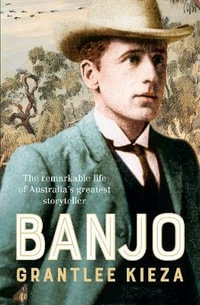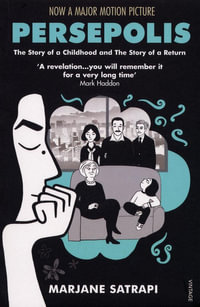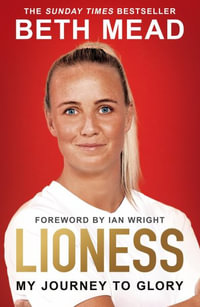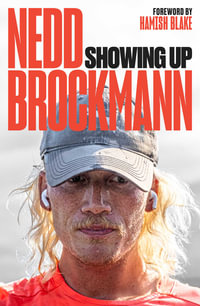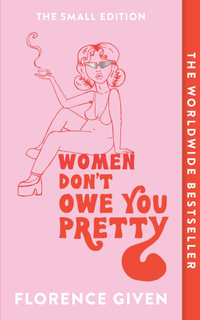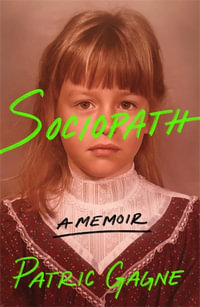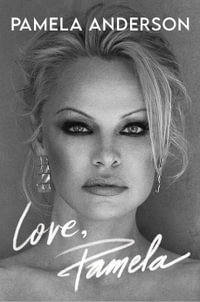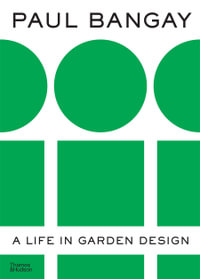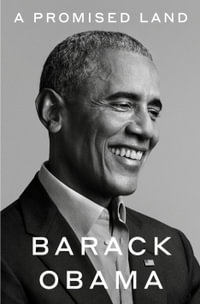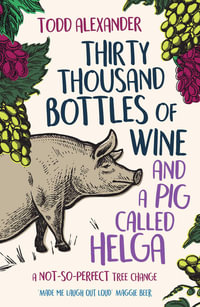
At a Glance
Paperback
304 Pages
304 Pages
Dimensions(cm)
17.5 x 11 x 2
17.5 x 11 x 2
Paperback
$14.99
or 4 interest-free payments of $3.75 with
In Stock and Aims to ship in 1-2 business days
As uplifting as it is moving, Holding the Man is a funny, sad and celebratory account of growing up gay, and a powerful love story.
In the mid-seventies at an all-boys Catholic school in Melbourne, Timothy Conigrave fell wildly and sweetly in love with the captain of the football team. So began a relationship that was to last for fifteen years, a love affair that weathered disapproval, separation and, ultimately, death.
With honesty and insight, Conigrave's bestselling memoir explores the highs and lows of any partnership- the intimacy, constraints and temptations. And the strength of heart both men had to find when they tested positive to HIV.
As uplifting as it is moving, Holding the Man is a funny, sad and celebratory account of growing up gay, and a powerful love story.
'A fine, tender and sexy book.' David Marr
'Full of compassion, candour and zest for life.' The Australian
'A charming love story.' Herald Sun
'Amazingly more than the sum of its parts, a book to stir you up and knock you around and wring you out.' Peter Robb
In the mid-seventies at an all-boys Catholic school in Melbourne, Timothy Conigrave fell wildly and sweetly in love with the captain of the football team. So began a relationship that was to last for fifteen years, a love affair that weathered disapproval, separation and, ultimately, death.
With honesty and insight, Conigrave's bestselling memoir explores the highs and lows of any partnership- the intimacy, constraints and temptations. And the strength of heart both men had to find when they tested positive to HIV.
As uplifting as it is moving, Holding the Man is a funny, sad and celebratory account of growing up gay, and a powerful love story.
'A fine, tender and sexy book.' David Marr
'Full of compassion, candour and zest for life.' The Australian
'A charming love story.' Herald Sun
'Amazingly more than the sum of its parts, a book to stir you up and knock you around and wring you out.' Peter Robb
Me
At the end of the sixties the world seemed very exciting for a nine-year-old. Things were changing at an incredible rate. And most of the changes seemed to be for the better, like the afternoon we all sat in the library watching a man take his first step on the moon of planet Earth. Even schooling was changing. My Grade Four teacher at the state school treated us like adults who were able to think for ourselves. He was open to all forms of learning. My last year at this school was spent drawing, writing poems; building Aboriginal humpies, dams and watercourses. We discussed space travel, pot and why boys should be allowed to have long hair.
In contrast was Miss O'Leary who gave us Catholic kids our injection of religion, all five of us in a cupboard at the end of the hall. At Christmas she gave each of us a crucifix made of foiled glass. As she handed me mine she said, 'You don't deserve this because you're wicked.'
She got into my head at the age when I was loading the operating system that forms self-image. Sure, the software was a mix of creativity, sunshine and games with the girls, but I was also becoming a Catholic. And looming large was the awareness that I was about to take a leap into Catholic manhood: an all-boys school, Kostka. Footy, cricket, smelly socks, and Jesuits in cassocks.
Even though Kostka was at the end of my street, all I knew of it was the high pale-orange brick walls and large copper gates, beyond which I occasionally glimpsed a concrete playground lined with oleanders and yew trees, and a whirlpool of boys in grey uniforms.
After I'd sat an entrance exam my mother and I were interviewed by the headmaster, who wanted to know whether, since she had married a non-Catholic, her children went to Mass. My mother's face was scrunched up as we walked back to the gates. 'That stuck-up bully sitting in judgement of me! Surely it's obvious that I want my children to be brought up in the Church, or we wouldn't be wasting our money putting you through a Jesuit school.' I found it odd that she was so vulnerable.
This was to be my first experience of dressing exactly the same as everyone else. The first time I heard 'fuck', 'shit' and 'arsehole'. The first time I had textbooks: the Jacaranda atlas; a catechism full of groovy drawings of doves, wheat and a Jesus who looked like a hippie; my first dictionary, and a book called Roget's Thesaurus with the words 'Find, Seek, Search, Discover' on its cover. Learning at Kostka was going to be a different experience. I spent hours writing my name on the title page of my books, covering them in sweet-smelling soft plastic, filling my drink bottle with orange cordial and putting it in the freezer.
The first day all the new boys met in the library. The headmaster's secretary drilled us on punctuality and compulsory sport. We were taken to our classrooms where boys were lined up waiting for the door to open. I tried to be inconspicuous, aware that everyone was looking at me and the other two new guys.
At the front of the line was a good-looking boy wearing sunglasses. From the other boys' gibes I learnt that he had almost poked his eye out in a sailing accident. They didn't bother him. He looked really cool.
My first year at this school was a big shock. I was keenly aware that these boys had a different life from mine. They were fulfilling expectations that they would be doctors and lawyers. 'Play' for them meant football. What I knew about footy you could have written on a piece of toilet paper. In order to survive I learnt to know which team was on top of the ladder and to say things like: 'carna Saints'. But as for what 'holding the man' meant or which team Jezza played for . . .
Grade Five Red was in the neglect of Mr Geddes. His idea of teaching was to write on the board 'Page 13, Exercises 4-9' and make us do them in silence. He'd sit on a desk and order one of us to scratch his back. He liked to terrorise us, picking his nose and wiping it on us, knocking our books off the desk, opening someone's bag and eating his lunch.
One day a boy called Kevin asked to be allowed to go to the toilet. Mr Geddes made him stand on the platform and sing 'Twinkle Twinkle Little Star'. Kevin did so, his legs jiggling in an attempt to stop pissing himself 'Now with actions.' None of us laughed. We were just glad it wasn't us. Kevin did the nursery rhyme with actions and then ran for the door.
Another time Mr Geddes told us to read a chapter about Cromwell and the Roundheads and left the room. We were doing as we were told when his head suddenly appeared through an open window. He ordered Kevin up on the platform to get the strap.
'But I wasn't doing anything, sir.'
'Exactly. You should have been reading about Cromwell and the Roundheads. Get up there before I make it the full six.' Heavy with persecution, Kevin sloped up to the platform and took his punishment.
The other regular victim was Andy, a milky fat kid with a skin rash and a permanently running nose. Geddes would tease him until he was in tears and then would get us all to sing a version of a folk song: 'Oh Andy, don't you weep, don't you mourn.'
When the bell went we would tumble out into the playground and rough-house each other, asserting our strength so that we would never become the milky fat kid who was so loathsome.
At the end of the sixties the world seemed very exciting for a nine-year-old. Things were changing at an incredible rate. And most of the changes seemed to be for the better, like the afternoon we all sat in the library watching a man take his first step on the moon of planet Earth. Even schooling was changing. My Grade Four teacher at the state school treated us like adults who were able to think for ourselves. He was open to all forms of learning. My last year at this school was spent drawing, writing poems; building Aboriginal humpies, dams and watercourses. We discussed space travel, pot and why boys should be allowed to have long hair.
In contrast was Miss O'Leary who gave us Catholic kids our injection of religion, all five of us in a cupboard at the end of the hall. At Christmas she gave each of us a crucifix made of foiled glass. As she handed me mine she said, 'You don't deserve this because you're wicked.'
She got into my head at the age when I was loading the operating system that forms self-image. Sure, the software was a mix of creativity, sunshine and games with the girls, but I was also becoming a Catholic. And looming large was the awareness that I was about to take a leap into Catholic manhood: an all-boys school, Kostka. Footy, cricket, smelly socks, and Jesuits in cassocks.
Even though Kostka was at the end of my street, all I knew of it was the high pale-orange brick walls and large copper gates, beyond which I occasionally glimpsed a concrete playground lined with oleanders and yew trees, and a whirlpool of boys in grey uniforms.
After I'd sat an entrance exam my mother and I were interviewed by the headmaster, who wanted to know whether, since she had married a non-Catholic, her children went to Mass. My mother's face was scrunched up as we walked back to the gates. 'That stuck-up bully sitting in judgement of me! Surely it's obvious that I want my children to be brought up in the Church, or we wouldn't be wasting our money putting you through a Jesuit school.' I found it odd that she was so vulnerable.
This was to be my first experience of dressing exactly the same as everyone else. The first time I heard 'fuck', 'shit' and 'arsehole'. The first time I had textbooks: the Jacaranda atlas; a catechism full of groovy drawings of doves, wheat and a Jesus who looked like a hippie; my first dictionary, and a book called Roget's Thesaurus with the words 'Find, Seek, Search, Discover' on its cover. Learning at Kostka was going to be a different experience. I spent hours writing my name on the title page of my books, covering them in sweet-smelling soft plastic, filling my drink bottle with orange cordial and putting it in the freezer.
The first day all the new boys met in the library. The headmaster's secretary drilled us on punctuality and compulsory sport. We were taken to our classrooms where boys were lined up waiting for the door to open. I tried to be inconspicuous, aware that everyone was looking at me and the other two new guys.
At the front of the line was a good-looking boy wearing sunglasses. From the other boys' gibes I learnt that he had almost poked his eye out in a sailing accident. They didn't bother him. He looked really cool.
My first year at this school was a big shock. I was keenly aware that these boys had a different life from mine. They were fulfilling expectations that they would be doctors and lawyers. 'Play' for them meant football. What I knew about footy you could have written on a piece of toilet paper. In order to survive I learnt to know which team was on top of the ladder and to say things like: 'carna Saints'. But as for what 'holding the man' meant or which team Jezza played for . . .
Grade Five Red was in the neglect of Mr Geddes. His idea of teaching was to write on the board 'Page 13, Exercises 4-9' and make us do them in silence. He'd sit on a desk and order one of us to scratch his back. He liked to terrorise us, picking his nose and wiping it on us, knocking our books off the desk, opening someone's bag and eating his lunch.
One day a boy called Kevin asked to be allowed to go to the toilet. Mr Geddes made him stand on the platform and sing 'Twinkle Twinkle Little Star'. Kevin did so, his legs jiggling in an attempt to stop pissing himself 'Now with actions.' None of us laughed. We were just glad it wasn't us. Kevin did the nursery rhyme with actions and then ran for the door.
Another time Mr Geddes told us to read a chapter about Cromwell and the Roundheads and left the room. We were doing as we were told when his head suddenly appeared through an open window. He ordered Kevin up on the platform to get the strap.
'But I wasn't doing anything, sir.'
'Exactly. You should have been reading about Cromwell and the Roundheads. Get up there before I make it the full six.' Heavy with persecution, Kevin sloped up to the platform and took his punishment.
The other regular victim was Andy, a milky fat kid with a skin rash and a permanently running nose. Geddes would tease him until he was in tears and then would get us all to sing a version of a folk song: 'Oh Andy, don't you weep, don't you mourn.'
When the bell went we would tumble out into the playground and rough-house each other, asserting our strength so that we would never become the milky fat kid who was so loathsome.
ISBN: 9780143202820
ISBN-10: 0143202820
Series: Popular Penguins
Published: 29th June 2009
Format: Paperback
Language: English
Number of Pages: 304
Audience: General Adult
Publisher: Penguin Australia Pty Ltd
Country of Publication: AU
Edition Number: 1
Dimensions (cm): 17.5 x 11 x 2
Weight (kg): 0.18
Shipping
| Standard Shipping | Express Shipping | |
|---|---|---|
| Metro postcodes: | $9.99 | $14.95 |
| Regional postcodes: | $9.99 | $14.95 |
| Rural postcodes: | $9.99 | $14.95 |
How to return your order
At Booktopia, we offer hassle-free returns in accordance with our returns policy. If you wish to return an item, please get in touch with Booktopia Customer Care.
Additional postage charges may be applicable.
Defective items
If there is a problem with any of the items received for your order then the Booktopia Customer Care team is ready to assist you.
For more info please visit our Help Centre.
You Can Find This Book In
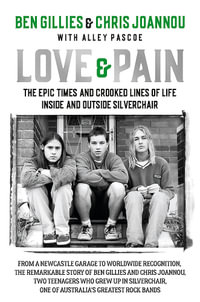
SIGNED COPY
RRP $44.99
$37.25
17%
OFF
OFF


